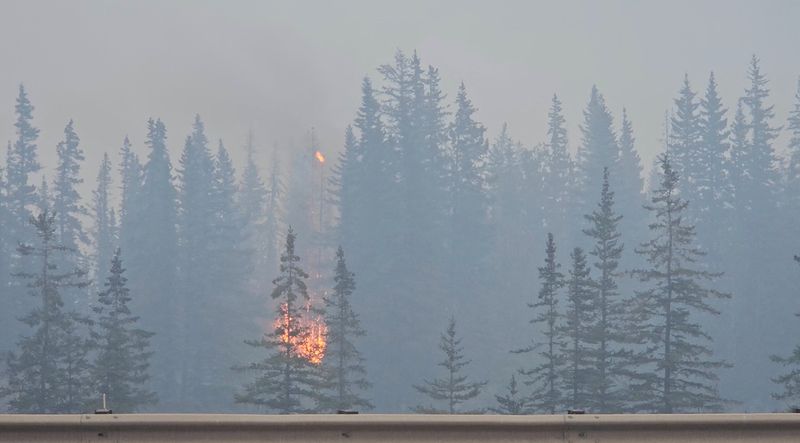By Nia Williams and Anna Mehler Paperny
(Reuters) – Severe wildfire seasons are increasingly hurting western Canada’s lucrative tourism industry, with some visitors beginning to avoid the busy late-summer months due to concerns about uncontrolled blazes, smoke-filled skies and road closures.
After a scorching start to July, nearly 600 wildfires are now ablaze across British Columbia and Alberta, including a huge fire that this week devastated the picturesque tourist town of Jasper in the Canadian Rockies.
Dozens of communities, including popular holiday spots in British Columbia’s Kootenay region, are under evacuation orders and several highways are closed.
This year’s surge in wildfire activity comes after Canada endured its worst-ever year for wildfires in 2023, when more than 15 million hectares (37 million acres) burned, including parts of the city of West Kelowna in the heart of British Columbia’s wine region.
Ellen Walker-Matthews, head of the Thompson Okanagan Tourism Association, said the industry was seeing a lot more last-minute travel decisions instead of booking in advance.
“It’s a huge blow. July and August are traditionally the busiest months in the region,” said Walker-Matthews, adding that while her region has been relatively unscathed by wildfires this summer, some visitors are choosing to avoid interior British Columbia altogether.
The members of the British Columbia Lodging and Campgrounds Association are reporting a 5-15% drop in bookings from a year ago, with the biggest declines coming from the hotter Okanagan and Cariboo regions, said Joss Penny, who heads the association.
“The concern is that this is something we have to live with and we have it every year now,” said Penny.
Although wildfires in Canada’s forests are natural and common, scientists say drier, hotter conditions fuelled by climate change are leading to more volatile and frequent blazes.
‘SMOKEY SKIES’
Some events, like the Salmon Arm Roots and Blues Festival, usually held in August, have now been rescheduled to earlier in the summer to avoid what is now seen as peak smoke season. The festival, which was cancelled last year due to nearby wildfires, was this year moved to July to benefit from “less smokey skies.”
Wildfires and extreme climatic events are prompting tourists to “change their plans not just temporarily, but permanently,” said Elizabeth Halpenny, a tourism researcher and professor at the University of Alberta, noting that seasonal workers in the sector are often the hardest hit as they have few protections during a bad season or amid a cataclysmic fire.
Tourism contributed C$7.2 billion to the British Columbia economy in 2022, and C$9.9 billion to Alberta in 2023, according to the latest government data.
Jasper National Park is one of Canada’s premier tourist destinations, with more than 2 million visitors a year flocking to see its pristine mountain landscapes and abundant wildlife, including grizzly bears, moose and elk.
Kelly Torrens, vice-president of product at international tour company Kensington Tours, described western Canada as a bucket-list destination. But the company now has 49 trips that were supposed to pass through Jasper this season in limbo. Six others were forced to evacuate the park when the fire hit.
Parks Canada has cancelled all camping reservations within Jasper National Park until Aug. 6 and with potentially 50% of the town’s structures destroyed by fire, the cleanup and rebuild could take years.

Halpenny is among those hedging their bets.
“I’ve booked a campsite stay in the mountain parks but at the same time, I booked a campsite out on the prairie somewhere and that’s my backup plan because I don’t want to miss out on my vacation with my family.”

